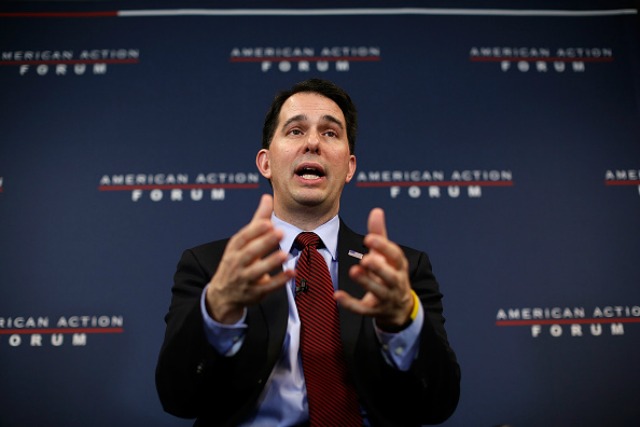Wisconsin Wants To Make Medicaid Applicants Take Drug Tests
By Stephen Gossett in News on May 25, 2017 8:45PM

Wisconsin Governor Scott Walker at the American Action Forum, 2015 / Getty Images / Photo: Win McNamee
In what would be an unprecedented requirement, Wisconsin could mandate childless adults who apply for Medicaid to submit to drug screening. The proposed condition is part of budget being pushed by Gov. Scott Walker, who is gearing to run for a third term, according to the Milwaukee Journal Sentinel.
According to to the Associated Press, while more than a dozen states use drug testing or screening for some benefits programs, none extend that requirement to Medicaid, the beleaguered social health-care program that remains popular with voters. Medicaid cuts under so-called Trumpcare would already see 14.4 million Americans lose coverage, if passed, according to the long-awaited CBO score.
Lawmakers in Wisconsin had previously laid the groundwork for such a mandate: Walker put forth a proposal to usher in the drug tests that was passed two years ago by the state's GOP-led Congress, according to the AP. Now it's "digging into the details." If the budget passes, the drug-test stipulation would need to get clearance at the federal level. With a seemingly friendly administration in the White House, such a go-ahead certainly seems plausible. (The Obama administration stalled Walker's previous efforts to require drug testing for food-stamp recipients.)
The proposal would also impose time limits for how long people can receive benefits without working or undergoing job training. "The changes could affect 148,000 childless adults in Wisconsin with incomes below the federal poverty level — $12,060 a year for a single adult and $16,240 a year for a couple," according to the MSJ.
Several other states, including Maine and Indiana, have also been pursuing the path of work mandates—a controversial call that has been advanced by President Donald Trump. The Washington Post notes:
"Although President Trump and his advisers talk of tailor-made innovation to match need, the states’ strategies draw on a similar repertoire — monthly premiums for people below the poverty line, time limits for coverage and fees for emergency room visits, among others. All are influenced by more conservative values that long ago filtered into welfare and other anti-poverty programs."
If Walker's proposal gets through the state and federal hurdles, it could still face a legal challenge. Courts in Florida and Michigan have ruled that requiring broad drug screening for people seeking welfare was unconstitutional. Under Wisconsin's push, those who refuse to be tested could not receive Medicaid for at least half a year; and people who test positive could keep benefits if they agree to treatment—although how that program would look would still need to be hammered out. Some 4,000 applicants would be given a drug test based on answers provided to questions about drug use, the MSJ reports.